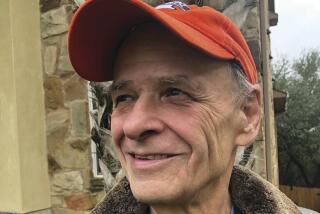FICTION
- Share via
PRIVATE FAME by Richard Burgin (University of Illinois Press: $16.95; 155 pp.). Richard Burgin country is like a crossroads in the woods: not a wilderness, but a half-settled Eastern suburb where we can see distant office buildings through the trees and hear basketballs bounce on playgrounds. Yet in the other direction, the roads disappear into primeval shadows.
A Burgin story, usually in the first person, begins in a deceptively easy, conversational way. The voice is “normal” even when the narrator’s behavior isn’t. And sometimes the behavior is hard to judge. A young woman aware of the dangers of city life refuses to sleep except for the “little bursts” of unconsciousness that come as she spends nights in a chair. A professor facing life after menopause tries to edit away her unpleasant memories. A boy who gets his kicks out of scaring people does the same thing as an adult, haunting subway stations in leather jacket and wig, menacingly muscular.
At some point, each of these 11 stories reaches the crossroads. The man who scares people frightens himself by breaking his rule against violence. Another man realizes that he doesn’t feel “the right way” toward his 8-year-old prospective stepdaughter. A woman confronts her father about what she believes was sexual abuse years ago. A young composer is offered help by an eminent older one--for a price.
Which way will the story go? Forward into the darkness or back into the leaf-dappled light and shade of ordinary neurosis? Burgin (“Man Without Memory”) is able to keep us guessing--the more so because his choices are sometimes surprisingly moderate. The longest story, about two Boston boys’ broken friendship, hinges on simple differences of class. But the shadows are always there--even in a thinly disguised Santa Barbara, where a woman afraid of her ex-husband insists on hiding from the sun in what seems to be its unchallengeable domain.
More to Read
Sign up for our Book Club newsletter
Get the latest news, events and more from the Los Angeles Times Book Club, and help us get L.A. reading and talking.
You may occasionally receive promotional content from the Los Angeles Times.










